Introduction
Affiliate marketing has a trust problem. Newcomers often see luxury cars and promises of overnight wealth. This creates skepticism. The doubt is valid because much of the content on social media is deceptive.
The industry itself is legitimate. It is a standard business model used by major companies like Amazon and Walmart. However, the way it is sold to beginners often feels like a scam.
This article separates the noise from the reality. We will analyze the mechanics of the business. We will explain why most beginners lose money. You will learn exactly what separates a real business from a “get rich quick” scheme.
Key Takeaways
- It is a logistics business. Affiliate marketing is simply connecting a buyer to a seller. It is a digital version of commission-based sales.
- The reputation is the problem. “Gurus” selling courses create the scam image. The actual business model is used by major global brands.
- You must own the asset. Real businesses rely on websites and email lists. Relying on social media algorithms is dangerous.
- Traffic is mandatory. Content without a distribution strategy is useless. You must have a plan to get eyes on your links.
- Trust creates income. You cannot sell to strangers immediately. You must solve a problem first. The commission is the reward for providing value.
- Patience is required. This is not a paycheck. It is an investment. You work upfront to earn passive revenue later.
Disclaimer: I am an independent Affiliate. The opinions expressed here are my own and are not official statements. If you follow a link and make a purchase, I may earn a commission.

Why the Industry Looks Like a Scam
Affiliate marketing has a branding crisis. The average person associates it with spam or pyramid schemes. This reputation is not accidental. It stems from two specific problems in the market.
The “Guru” Trap
Social media is full of influencers selling a dream. They show rented luxury cars. They flash stacks of cash. The message is always the same. They claim you can get rich quickly with zero effort.
This is not affiliate marketing. This is “BizOp” (Business Opportunity) marketing. These people are not making money by selling products. They are making money by selling courses about how to make money. It is a hall of mirrors. The loud promises create skepticism.
The Low Barrier to Entry
You do not need a degree to start. You do not need capital. Anyone with an internet connection can sign up for an affiliate link. This accessibility is a double-edged sword.
It allows spammers to flood the internet. Amateurs paste links in Facebook comments. They send unsolicited DMs. They write low-quality reviews. This behavior annoys users. It damages the reputation of legitimate businesses.
Lifestyle vs. Performance
We must distinguish between the image and the job. “Lifestyle Marketing” focuses on the rewards. It shows beaches and laptops. “Performance Marketing” focuses on the work. It involves data analysis, SEO, and copywriting.
Real affiliate marketing is boring. It looks like a spreadsheet. It involves writing thousands of words. It requires testing different headlines. If someone promises you money without work, they are lying. The industry is legitimate, but the marketing around the industry is often deceptive.
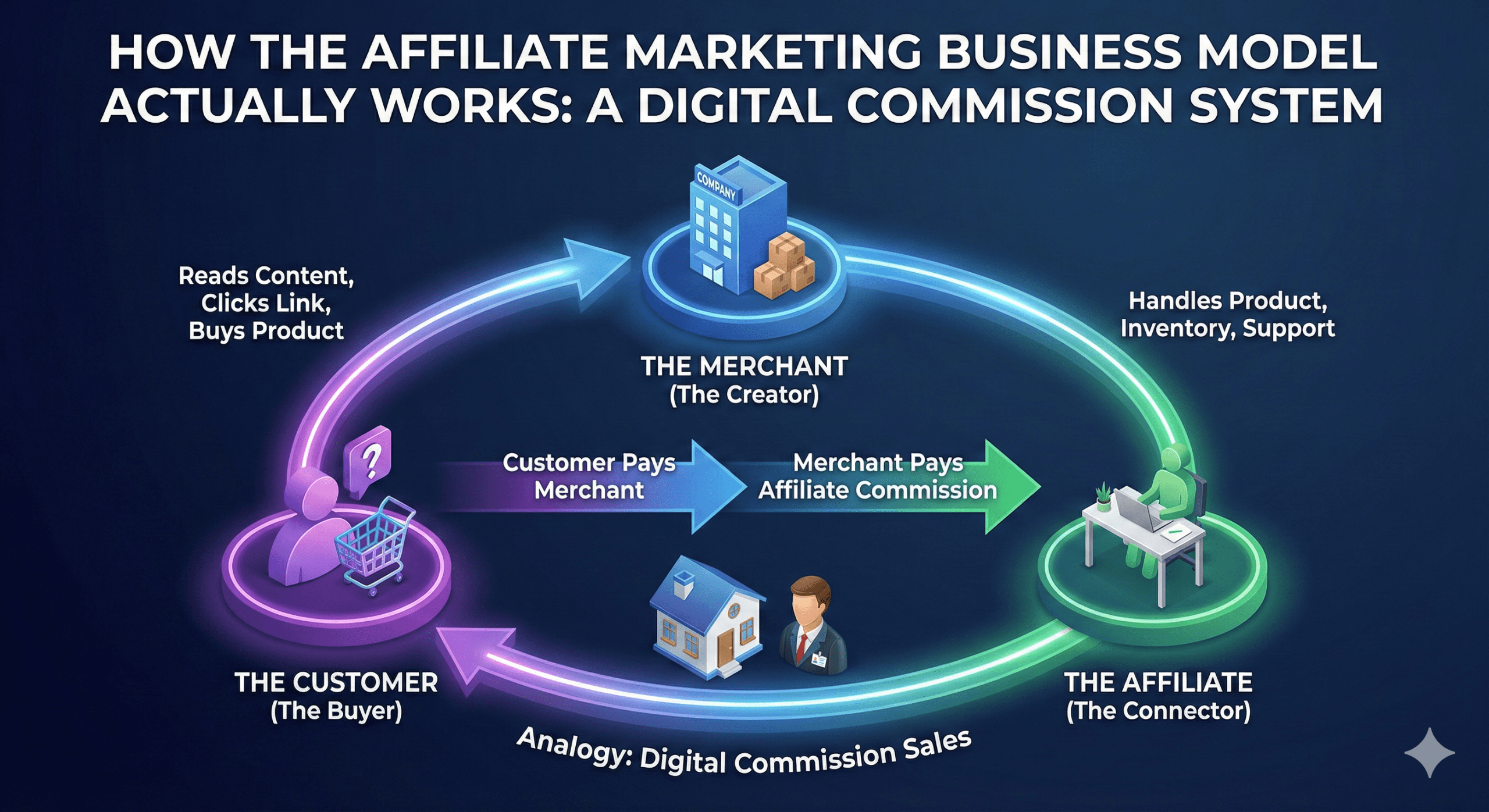
How the Business Model Actually Works
We need to strip away the hype. Affiliate marketing is simple commerce. It is a referral system.
Three specific parties make the system work.
The Merchant (The Creator)
This is the company with the product. They handle the inventory. They manage shipping. They deal with customer service. They want more customers, but they do not want to hire thousands of sales staff.
The Affiliate (The Connector)
This is you. Your job is marketing. You find people who need the product. You create content that explains the solution. You build trust. You send the customer to the merchant using a special tracking link.
The Customer (The Buyer)
This is the end user. They have a problem. They are looking for an answer. They read your content. They click your link. They buy the product from the merchant.
The Value Flow
The customer pays the merchant. The merchant pays you a commission. The customer does not pay extra. The cost of your commission comes from the merchant’s marketing budget.
It is exactly like a real estate agent selling a house. The agent does not build the house. The agent does not buy the house. The agent connects the buyer to the seller and earns a fee.
Affiliate marketing is simply a digital version of commission sales. It is scalable because you do not need to talk to the customer. Your content does the selling for you 24 hours a day.
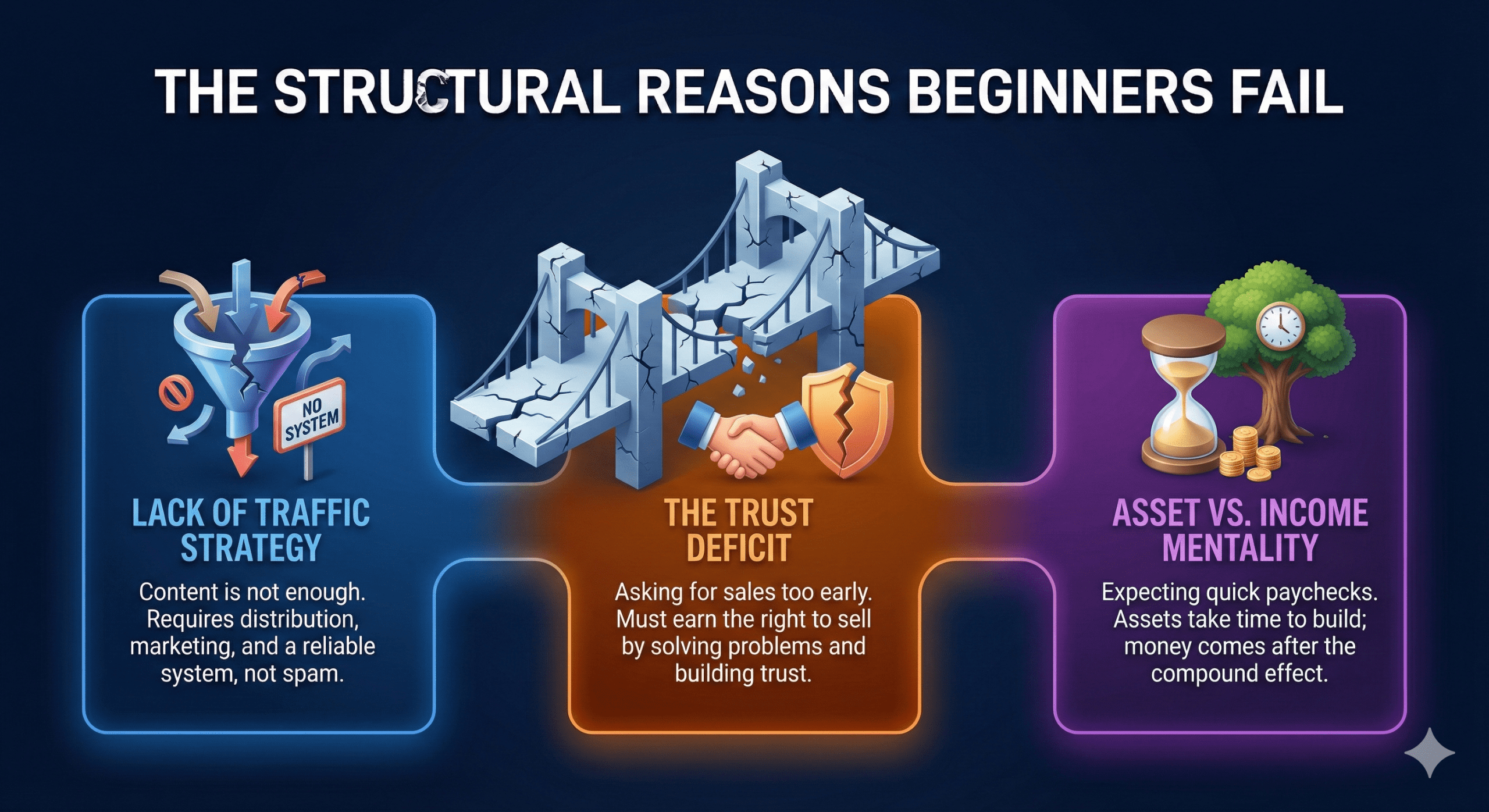
The Structural Reasons Beginners Fail
The business model works. The execution is where most people fail.
The failure rate is high. This is not because the industry is a scam. It is because beginners lack a professional strategy.
Lack of Traffic Strategy
New affiliates often think content is enough. They publish a post and wait. Nothing happens. They do not understand distribution. You are not just a writer. Your primary job is marketing. Posting random links on social media is not a business plan. It is spam. If you do not have a reliable system to get eyes on your content, you will fail.
The Trust Deficit
Beginners ask for the sale too early. They say “Buy this now.” No one buys from a stranger. You must earn the right to sell. You earn it by solving a problem first. Low-quality content leads to low trust. Low trust leads to zero sales.
Asset vs. Income
This is the biggest killer. Newbies expect a paycheck after two weeks. This is not a job. It is an asset. Assets take time to build. You work for free in the beginning. The money comes later. Most people quit during this phase. They leave right before the compound effect kicks in.
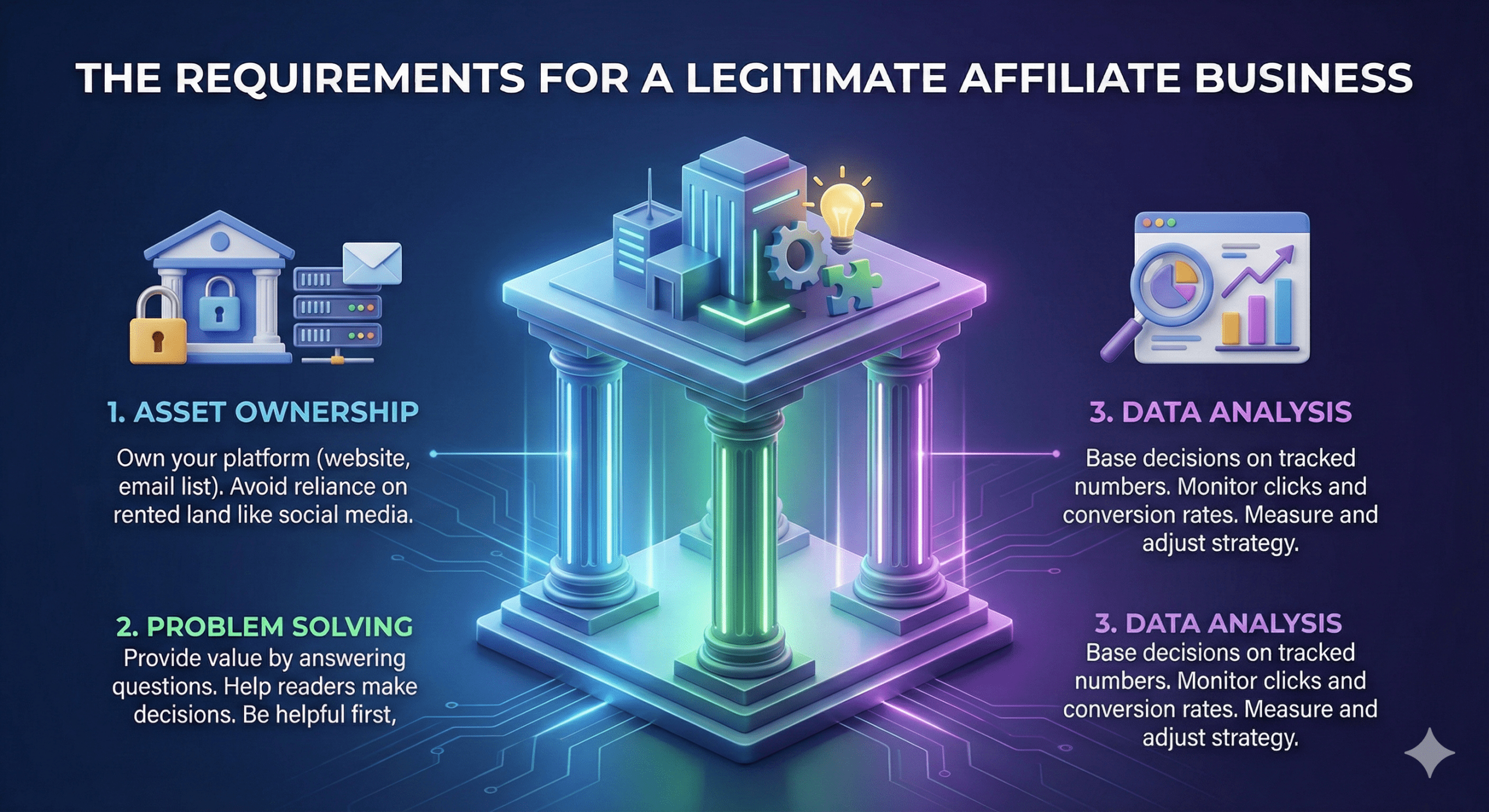
The Requirements for a Legit Business
You must treat this like a real company. A legitimate business has specific requirements.
Asset Ownership
You must own your platform. Instagram and TikTok are rented land. The algorithm can change tomorrow. You could lose your audience instantly. A real business builds assets it controls. You need your own website. You need your own email list. These are assets that no one can take away from you.
Problem Solving
Legitimate businesses solve problems. Scams sell dreams. Your content must answer specific questions. It must help the reader make a decision. If you do not add value, you do not earn a commission. The goal is to be helpful first and profitable second.
Data Analysis
Decisions must be based on data. Feelings do not matter in business. You need to track your clicks. You must monitor your conversion rates. Professionals adjust their strategy based on what the numbers say. Amateurs guess. Professionals measure.
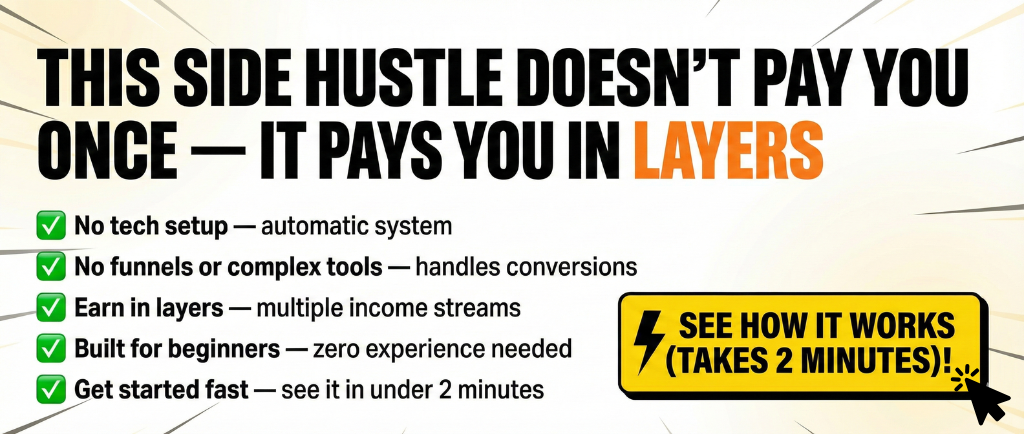
Conclusion
Affiliate marketing is hard work. It is a legitimate career path. It is also the most misunderstood industry online.
You now know the difference between the hype and the reality. The model works if you treat it with respect. It fails if you treat it like a casino.
The choice is yours. You can chase shortcuts. You can buy into the fake promises of quick wealth. Or you can build a real asset.
Ignore the noise. Focus on the mechanics. Build something that solves real problems. The income is a byproduct of the value you create.
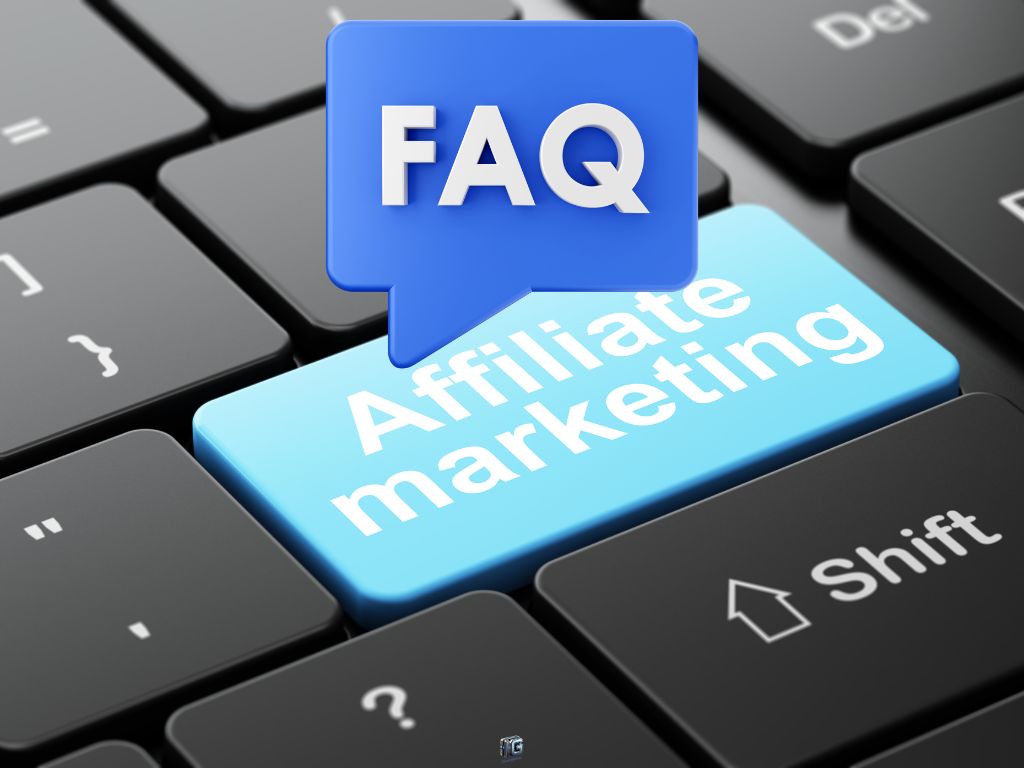
Frequently Asked Questions
Is affiliate marketing a pyramid scheme?
No. Pyramid schemes rely on recruitment. You only make money by finding other people to join. Affiliate marketing relies on product sales. You make money when a customer buys a real product from a real company. You do not need to recruit anyone.
Is the market saturated in 2026?
The market is crowded. However, it is not saturated. Most affiliate content is low quality. There is always room for high-quality, helpful answers. You just need to be specific. You cannot compete on broad topics, but you can win in specific niches.
How fast can I make money?
It takes time. Most legitimate businesses take 6 to 12 months to see profit. If you need money next week, get a job. This involves building an asset. Assets grow slowly at first.
Do I need to buy a course to succeed?
No. Information is free. You can learn everything on YouTube or Google. Courses sell organization. They save time. They are not required for success. Be careful with expensive courses that promise quick riches.
Is it truly passive income?
Eventually it becomes passive. Initially it is very active. You must build the content first. Once the content ranks on Google, it earns money while you sleep. The work is front-loaded. You work for free now to get paid later.
0 Comments